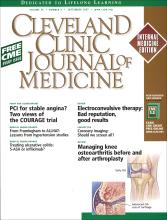Index by author
Achkar, Jean-Paul
- You have accessUlcerative colitis: Responding to the challengesJean-Paul Achkar, MDCleveland Clinic Journal of Medicine September 2007, 74 (9) 657-660;
Aminosalicylates are the first-line therapy for patients with mild to moderate active ulcerative colitis. Infliximab is now approved for moderately to severely active ulcerative colitis in patients who have had an inadequate response to conventional therapy.
Barsoum, Wael K.
- You have accessManaging knee osteoarthritis before and after arthroplastyJames Rosneck, MD, Carlos A. Higuera, MD, Nabil Tadross, MD, Viktor Krebs, MD and Wael K. Barsoum, MDCleveland Clinic Journal of Medicine September 2007, 74 (9) 663-671;
Primary care physicians play a key role in the diagnosis and nonoperative management of knee osteoarthritis, including monitoring for problems in patients who have undergone knee replacement surgery.
Bhatt, Deepak L.
- You have accessInterpreting the Courage TrialDeepak L. Bhatt, MDCleveland Clinic Journal of Medicine September 2007, 74 (9) 618-620;
We are fortunate to have a point-counterpoint between Dr. William Boden, the principal investigator of the Clinical Outcomes Utilizing Percutaneous Coronary Revascularization and Aggressive Drug Evaluation (COURAGE) trial, and Dr. Dean Kereiakes, a leading interventional cardiologist.
Boden, William E.
- You have accessInterpreting the Courage TrialWilliam E. Boden, MDCleveland Clinic Journal of Medicine September 2007, 74 (9) 623-633;
We found that as an initial management strategy in patients with stable coronary artery disease, percutaneous coronary intervention did not reduce the incidence of death, myocardial infarction, or other major cardiovascular events when added to optimal medical therapy.
Higuera, Carlos A.
- You have accessManaging knee osteoarthritis before and after arthroplastyJames Rosneck, MD, Carlos A. Higuera, MD, Nabil Tadross, MD, Viktor Krebs, MD and Wael K. Barsoum, MDCleveland Clinic Journal of Medicine September 2007, 74 (9) 663-671;
Primary care physicians play a key role in the diagnosis and nonoperative management of knee osteoarthritis, including monitoring for problems in patients who have undergone knee replacement surgery.
Kereiakes, Dean J.
- You have accessInterpreting the Courage TrialDean J. Kereiakes, MDCleveland Clinic Journal of Medicine September 2007, 74 (9) 637-642;
COURAGE had several problems, and tells us nothing new.
Krebs, Viktor
- You have accessManaging knee osteoarthritis before and after arthroplastyJames Rosneck, MD, Carlos A. Higuera, MD, Nabil Tadross, MD, Viktor Krebs, MD and Wael K. Barsoum, MDCleveland Clinic Journal of Medicine September 2007, 74 (9) 663-671;
Primary care physicians play a key role in the diagnosis and nonoperative management of knee osteoarthritis, including monitoring for problems in patients who have undergone knee replacement surgery.
Lauer, Michael S.
- You have accessScreening for coronary heart disease: Has the time for universal imaging arrived?Michael S. Lauer, MDCleveland Clinic Journal of Medicine September 2007, 74 (9) 645-656;
Screening for coronary heart disease by means of an imaging test is not supported by evidence and is not endorsed by professional societies or the US Preventive Services Task Force.
Levy, Daniel
- You have accessHypertension from Framingham to ALLHAT: Translating clinical trials into practiceDaniel Levy, MDCleveland Clinic Journal of Medicine September 2007, 74 (9) 672-678;
Most people with hypertension are still not being adequately treated. Newer drugs have not surpassed diuretics in efficacy and safety. Rather than trying to develop newer, more expensive agents, our priority should be to treat more patients and to treat them more aggressively.
Malone, Donald
- You have accessElectroconvulsive therapy: What the internist needs to knowMayur Pandya, DO, Leopoldo Pozuelo, MD and Donald Malone, MDCleveland Clinic Journal of Medicine September 2007, 74 (9) 679-685;
Despite its bad reputation, electroconvulsive therapy is safe and effective for treating a number of psychiatric disorders. For some patients, it is the only therapy that works.




